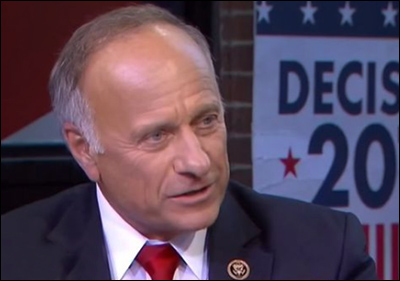By Jim Ellis
Aug. 20, 2020 — The 1988 movie “Eight Men Out” about the 1919 baseball World Series carries a title that also aptly describes the 2020 congressional primary season. At this early point in the voting cycle, already eight US House members have been denied re-nomination, which will oust them from office — a large number when comparing to typical campaign years.It’s worth noting these results because the incumbent defeats are geographically widespread and not confined to one party. Of the eight, five are Republicans, three are Democrats, and each come from different states.
Looking at the eight campaigns, however, only two reasons largely explain the incumbent losses within the respective intra-party elections: ideology and ethics.
Florida Freshman Rep. Ross Spano (R-Dover) from his Lakeland-anchored district this past Tuesday is the latest to lose. The others are, chronologically from the beginning: Reps. Dan Lipinski (D-IL), Steve King (R-IA), Denver Riggleman (R-VA), Eliot Engel (D-NY), Scott Tipton (R-CO), Steve Watkins (R-KS), Lacy Clay (D-MO), and Spano.
In each case, the Democratic losses are ideologically driven. In Illinois, New York, and Missouri, veteran Democrats lost their seats to challengers from the far left, all backed by the Justice Democrats PAC that is loosely associated with New York Rep. Alexandria Ocasio-Cortez. The insurgent campaign strategy in each case was to cast the incumbent as not being sufficiently progressive in addition to more specific attacks.
In Illinois back in March, media consultant Marie Newman returned to again challenge Rep. Lipinski after losing to him 51-49 percent in the 2018 Democratic primary. Rep. Lipinski, an eight-term Chicago suburban congressional veteran whose father held the seat for 22 years before him, had established a moderate record — yet even moving left for the current term couldn’t stop the coming trend. Turnout increased 16 percent when compared to the 2018 primary, and Newman flipped a 49-51 percent loss into a 47-45 percent victory.
Eliot Engel represented the Bronx in Congress for what will be 32 years after serving for 12 years in the New York State Assembly. Aided by Engel campaign mistakes, middle school principal Jamaal Bowman swept to victory with strong assistance from the Justice Democrats. The key themes here were Engel losing touch with his constituents and being out of step with today’s Democratic Party.



